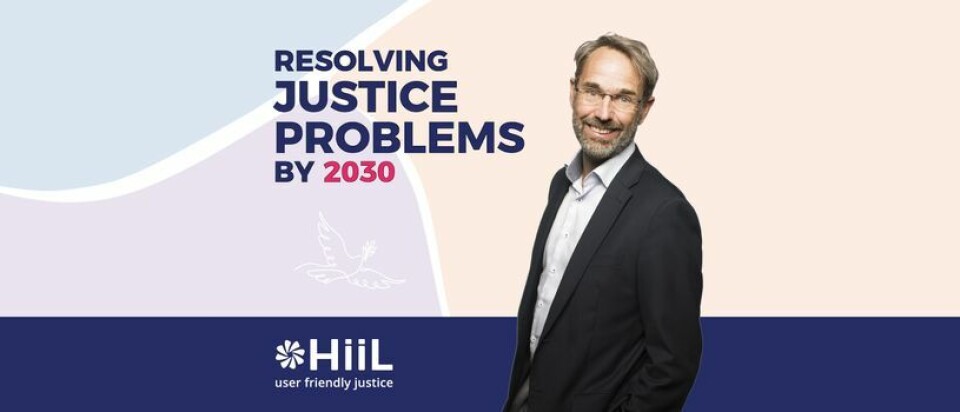“For us, justice systems must be user-friendly. That is affordable, accessible and easy to understand. To make that transformation they must put people and the outcomes they need at the centre, not institutions and existing procedures,” Muller explained.
Increasingly, people are asking their governments and judiciaries to deliver justice more effectively. “This is a critical factor in ensuring people have a good way to make a living, the security of a home, harmonious family relationships, access to public services, and a feeling of being safe,” said Muller.
“In most countries of the world the resolution rates don’t get much higher than 30%. The main providers of justice don’t meet the demand, by a long shot. And while this is happening, the justice marketplace remains accessible only to limited product- and services providers and innovation is limited. We see that the most vulnerable are particularly affected. They might fall back into the informal economy or face corruption and violence as a result. Doing nothing is too risky.”
HiiL has been at the forefront of a new approach called people-centred justice programming. “It is an integrated approach that has five core elements – gathering data, sharing best practices, scaling innovations, creating an enabling environment and ensuring engagement to strengthen the network – which together focus on getting justice systems to fulfil their potential to society and the economy,” Muller clarified.
It starts with collecting data to establish what problems people have, how they go about trying to prevent or resolve them, and what impact these problems have on their lives. So far HiiL has done this research in more than 20 countries and published the results on the Justice Dashboard.
“We just launched our Justice Needs and Satisfaction survey in Niger. More than 6000 Nigeriens were asked about their justice experiences. The data will form the backbone of a people-centred justice programme that the Ministry of Justice of Niger is partnering with HiiL on.”
HiiL is also pioneering evidence-based work as an element of people-centred justice programming. “Like the health sector, the justice sector must start building a repository of best practices – interventions that work best to prevent or resolve specific justice problems.”
HiiL has produced best practice guidelines on family, employment, land, neighbour and traffic accidents, which are available on their Justice Dashboard. These guidelines are also disseminated directly to relevant government agencies, NGOs, and donor agencies in their programme countries.
“In Uganda, for example, we facilitated a process for justice practitioners to set up implementation plans with 27 justice organisations. At least 260 family justice practitioners now have access to the Uganda Family Justice Catalogue and apply it in their work,” Muller shared.
The key is to find ways to get the interventions that work best to as many people as possible, based on a sustainable funding model. HiiL calls those delivery models “gamechangers”. “Through our research we have been able to find categories of gamechangers that have the potential to scale.” HiiL has identified seven gamechanger categories: Community justice services, user-friendly contracts, one-stop-shop dispute resolution tribunals, problem-solving courts, claiming platforms, prevention programmes and services, and online information and advice portals. “We facilitate Innovation Labs to develop these gamechangers based on context needs in each country,” said Muller.
HiiL’s Justice Accelerator programme is dedicated to scaling gamechangers as well. Following a call for innovations, an annual cohort of justice innovations is selected. They receive an intensive four-month training programme and some start-up funding. At the end of the cycle, they pitch their game-changing justice innovations to a panel of judges.
“The first prize of the 2021 Innovating Justice Challenge went to THR Media, a Nigeria-based social enterprise that uses new media and technology solutions to help women and girls break free, find shelter, and recover from sexual and gender-based violence,” said Muller.
Over the past few years 139 innovators have participated with an ever-increasing number of people turning to their services. These include iVerify in Nigeria who offers employee, company, certificate and property verification. In South Africa, Creative Contracts makes legal agreements in comic form so everyone can understand them. In Kenya, Peleza conducts employment background checks, KYC and vendor due diligence. The 2022 Justice Accelerator programme kicked off with 15 inspirational startups representing six countries.
HiiL understands it is necessary to create an enabling environment for change to happen. The innovations cannot really scale if the regulatory and political environment does not change. “We also work on that by facilitating stakeholder dialogues with a diverse group of leaders and stakeholders from the justice sector and people from the business community. These processes can help build political will, a supporting coalition, and the taking of steps towards a regulatory environment that opens the market to more service providers,” Muller explained.
“The final element of our integrated approach involves building an ecosystem that ensures strategic engagement and accountability, so that the justice sector keeps moving in the right direction,” he added.
“In our Strategy 2020-2024 we aim to support countries in achieving a turning point towards people-centred justice. The countries we currently work in are Ethiopia, the Netherlands, Niger, Nigeria, Tunisia, and Uganda.”
So what can justice practitioners, innovators and investors do to make justice better?
“Change is in the air!” declared Muller. “More justice practitioners see the value of data and research and seek new ways to improve access to justice. These are judges, lawyers, innovators and informal workers in the justice sector. They are trying new things like community justice services, one-stop-shop dispute resolution and user-friendly contracts. They not only contribute to better justice, but also to the improved wellbeing of citizens. If you want to be part of that movement, create a fairer future for all, then come talk to us,” Muller urged.
For further information click here.
To join Africa Legal's mailing list please click here

